Welcome, dear readers, to the pages of fengshuihome.ru, where we together explore the ancient wisdom of creating a harmonious space. Today we will talk about one of the most intimate and important corners of our home – the bedroom. This is a place where we restore our strength, immerse ourselves in the world of dreams, and draw energy for the new day. The quality of your sleep, your health, relationships, and overall well-being depend on how correctly your bedroom is arranged. And, of course, living plants play a far from minor role in this matter. Their presence can both beneficially influence the atmosphere and, with the wrong choice, disrupt the delicate energy balance.
Harmony in the Bedroom: Why Plant Choice is So Important in Feng Shui?
The bedroom is a sanctuary for the soul and body, a place where Yin energy prevails, promoting peace, relaxation, and restoration. In the context of Feng Shui, every object in this space, including living plants, carries a specific Qi energy. Plants, being living organisms, actively interact with this energy, purifying the air, radiating life force, and influencing our subconscious. It is believed that the correct choice and placement of plants in the bedroom can significantly improve sleep quality, strengthen health, harmonize personal relationships, and even attract good fortune.
Imagine your bedroom not just as a room, but as a living organism that breathes with you. Plants in it act as lungs, filters, and even energy antennas. They can absorb negative energy, transform it, and fill the space with fresh, positive Qi. But, like any living beings, they require a careful approach. An incorrectly chosen plant can become a source of anxiety, excessive activity, or even contribute to the outflow of favorable energy, which, of course, is highly undesirable for a place of rest.
For centuries, Feng Shui sages have observed the influence of various life forms on human existence. They understood that even a delicate leaf or the aroma of a flower can change mood, improve well-being, and even influence the outcome of important life events. That is why we pay so much attention to details when it comes to arranging the bedroom. Our goal is to create an oasis where every cell of your body and soul can find peace and harmony.
Basic Feng Shui Principles for Plants in the Bedroom: Qi Energy and Calmness
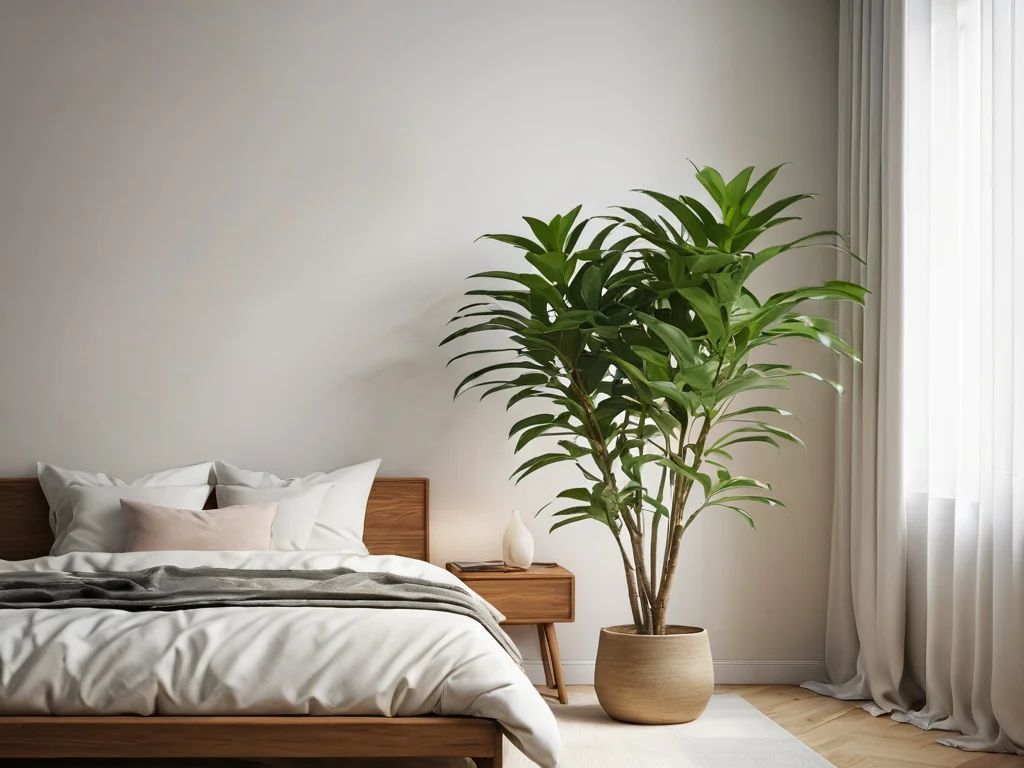
When we talk about bedroom Feng Shui, the main word is calmness. This is a space intended for rest, intimacy, and restoration, so soft, enveloping Yin energy should prevail here. The plants we choose for the bedroom should support this balance, not disrupt it.
- Balance of Yin and Yang: Plants are believed to emit Yang energy, which is active and dynamic. In the bedroom, it is necessary to avoid an excess of Yang to maintain calmness and prevent insomnia. Therefore, it is important to choose plants with gentle energy that promote tranquility.
- Smooth Shapes and Round Leaves: Plants with sharp, thorny, or upward-pointing leaves create so-called “Sha Qi” – aggressive, cutting energy. For the bedroom, plants with round, soft leaves are preferred, symbolizing harmony, protection, and coziness. Such shapes help Qi energy circulate smoothly throughout the room without creating obstacles.
- Size Matters: Overly large or sprawling plants can suppress energy in a small bedroom, creating a sense of crampedness and clutter. It is believed that they can “take away” some of your energy during sleep. For the bedroom, medium and small-sized plants are better, which fit harmoniously into the space without dominating it.
- Healthy and Well-Maintained Plants: Sick, wilting, or dry plants are a source of stagnant, negative Qi energy. They not only spoil the aesthetic appearance of the room but also attract misfortune and illness. Always monitor the condition of your green pets, promptly remove dry leaves, and provide them with proper care. A healthy plant is a source of living, positive energy.
- Moderation in Quantity: Although plants are beneficial, an excess of them in the bedroom can lead to an over-saturation of Yang energy and disrupt the balance of oxygen and carbon dioxide, especially at night. A small number of carefully selected plants will be much more effective than a whole “winter garden.”
Remember that every element in your bedroom should contribute to a feeling of peace and security. Choosing plants according to Feng Shui is not just following rules, but intuitively creating a space that nourishes your soul and body.
Stop List: What Plants Should Absolutely Not Be Kept in the Bedroom (and Why)
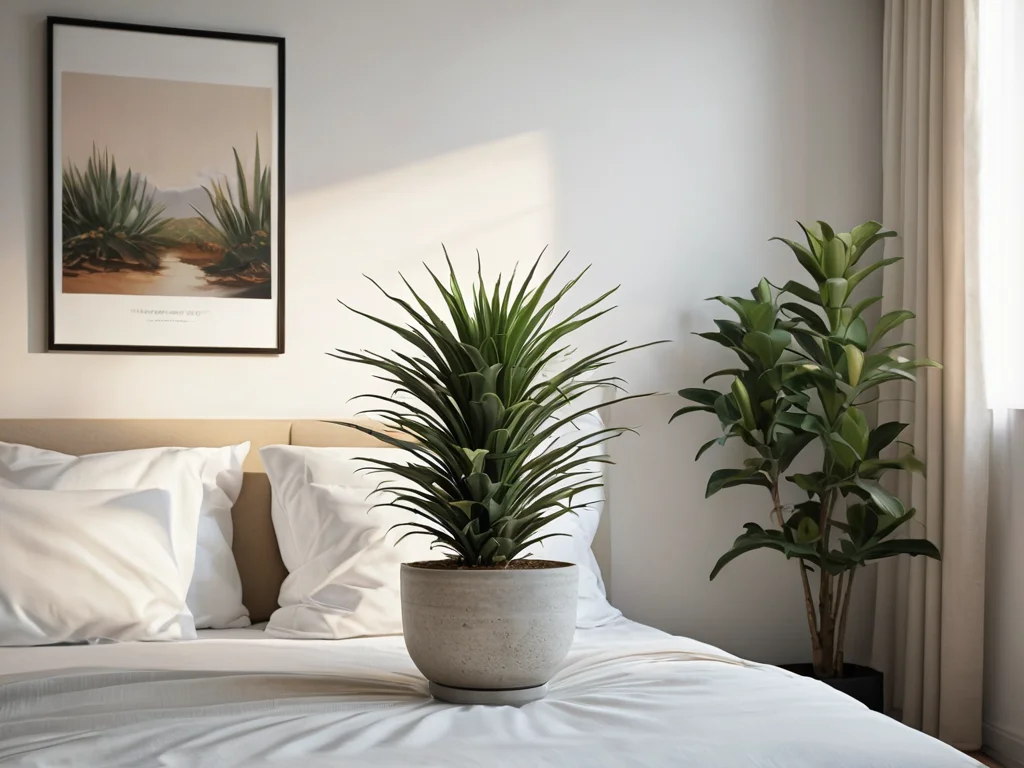
As a Feng Shui Master, I constantly remind my students and clients: not all that glitters is gold, and not every green plant is beneficial. In the bedroom, some types of plants can become a source of disharmony, disturbing your sleep and overall well-being. They are believed to generate aggressive Sha Qi or overly active Yang energy. Let’s look at which green inhabitants you should refrain from keeping in your bedroom:
- Plants with Sharp Leaves and Thorns (cacti, agaves, yuccas): This is perhaps the most well-known prohibition. Sharp thorns and leaves are believed to emit “arrows” of negative Sha Qi energy, which can disrupt peace, provoke quarrels, and even cause health problems. They symbolize aggression and protection, which is completely inconsistent with the relaxing atmosphere of the bedroom. Their place is outdoors or in work areas where active energy is needed for protection.
- Plants with Strong Fragrance (lilies, some types of orchids, hyacinths): Although many flowering plants have a wonderful scent, a strong fragrance in the bedroom can cause headaches, allergies, or simply interfere with restful sleep. From a Feng Shui perspective, excessive aroma overstimulates the senses, distracting from relaxation. This is especially true at night when the body needs to rest from external stimuli.
- Plants with Large, Sprawling Canopies or Overly Active Growth (Monstera, Ficus Benjamina, Dieffenbachia): Large plants can create a feeling of heaviness, oppression, and clutter, especially in small bedrooms. They are believed to generate too much Yang energy, which is not conducive to relaxation. Furthermore, their rapid growth and large leaves can symbolize excessive activity that interferes with peaceful sleep.
- Vining Plants and Creepers (ivy, pothos): In Feng Shui, vining plants are often associated with the need for attachment, dependence, or difficulties in personal relationships. Their ability to wrap around everything can symbolize entanglement or “strangling” freedom. For the bedroom, where clarity and openness are important, this is not the best choice. Moreover, their drooping leaves can create a sense of sadness or gloom.
- Poisonous Plants (Dieffenbachia, Oleander, Euphorbia): Despite their beauty, their toxicity makes them absolutely unsuitable for the bedroom. The risk of accidental contact with sap or leaves, especially if there are children or pets in the house, is too high. From an energetic standpoint, poisonous plants carry energy that can be harmful to your well-being.
- Wilting or Sick Plants: This is not so much a category of species as a condition. Any plant that looks unhealthy, wilts, or dies is a source of “dead” or stagnant Sha Qi energy. It not only provides no benefit but actively drains life force from the space, attracting illness and misfortune. Such plants must be immediately either healed or removed from the home.
Remember that your bedroom is a place for relaxation and rejuvenation. When choosing plants, always be guided by the principle of creating harmony and peace. If in doubt, it is better to refrain from a questionable choice.
Green Sleep Allies: Top 5 Plants for a Healthy Bedroom Atmosphere
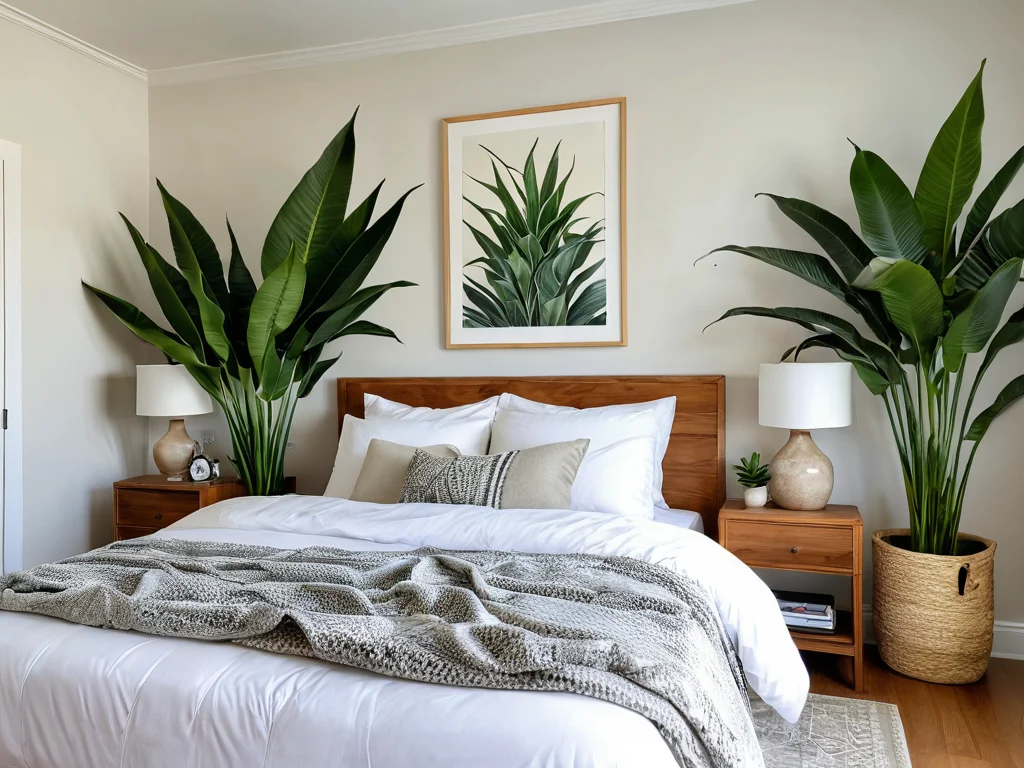
After discussing what to avoid, it’s time to focus on plants that will become true green allies for your sleep and well-being. These plants not only fit beautifully into the bedroom’s Feng Shui energy but are also known for their beneficial properties, such as air purification and creating a relaxing atmosphere. Here is our top 5:
- Sansevieria (Mother-in-law’s Tongue, Snake Plant):
- Why it’s a great choice: This plant is a true champion of air purification. Sansevieria’s uniqueness lies in its ability to absorb carbon dioxide and release oxygen at night, unlike most other plants that do so during the day. From a Feng Shui perspective, its vertical, fleshy leaves symbolize growth, strength, and protection. It is believed to ward off negative energy and bring good luck.
- Health Benefits: Filters benzene, formaldehyde, trichloroethylene, xylene, and toluene from the air, improving its quality and promoting deeper sleep.
- Care: Unpretentious, tolerates various lighting conditions, and does not require frequent watering. Ideal for those without a green thumb.
- Lavender (English Lavender):
- Why it’s a great choice: A small potted lavender bush (or even a sachet of dried flowers) is known for its calming properties. Its aroma helps reduce stress and anxiety levels and promotes quick falling asleep. In Feng Shui, lavender is associated with purification, peace, and love.
- Health Benefits: Lavender’s aroma is proven to improve mood, reduce heart rate and blood pressure, creating ideal conditions for sleep.
- Care: Requires plenty of light and moderate watering. Can be a bit fussy, but its benefits are worth it. Important: for the bedroom, it is better to choose varieties with a less intense aroma so that it is not too intrusive.
- Aloe Vera:
- Why it’s a great choice: This is another powerful air purifier that, like Sansevieria, releases oxygen at night. Aloe’s succulent leaves symbolize longevity and health. Aloe is believed to bring prosperity into the home and ward off misfortune. Its soft, rounded shapes are ideal for the Yin atmosphere of the bedroom.
- Health Benefits: Improves air quality by absorbing harmful chemicals. Additionally, aloe juice has long been used in folk medicine for wound healing and reducing inflammation.
- Care: Very easy to care for, loves bright light and infrequent watering. Thrives on a windowsill.
- Gardenia (Cape Jasmine):
- Why it’s a great choice: Gardenia is believed to reduce anxiety and promote deep, restorative sleep with its delicate, sweet fragrance. In Feng Shui, it is associated with love, purity, and healing. Its white flowers bring a sense of peace and tranquility to the bedroom.
- Health Benefits: Research suggests that a compound found in gardenia may have an effect similar to some sedatives, helping to fall asleep faster.
- Care: More demanding to care for – it needs bright but indirect light, high humidity, and regular watering. This plant is for those willing to give it attention, but it will generously reward you.
- Spathiphyllum (Peace Lily):
- Why it’s a great choice: Spathiphyllum excellently purifies the air of harmful substances such as benzene, formaldehyde, and ammonia, and also helps to humidify the air. Its elegant white spathes (delicate, rounded shapes) are ideal for creating a calm atmosphere. In Feng Shui, Spathiphyllum is considered a symbol of purity, peace, and, as the name suggests, female happiness, attracting harmony into relationships.
- Health Benefits: Improves air quality and helps create comfortable humidity, which is beneficial for breathing and sleep.
- Care: Prefers partial shade and regular watering. Easy to care for if you monitor soil moisture.
By choosing any of these plants, you not only decorate your bedroom but also invest in your health and mental balance. Remember that living plants are not just decor; they are active participants in creating a favorable energetic environment.
Additional Helpers: Plants that Attract Love and Prosperity to the Bedroom
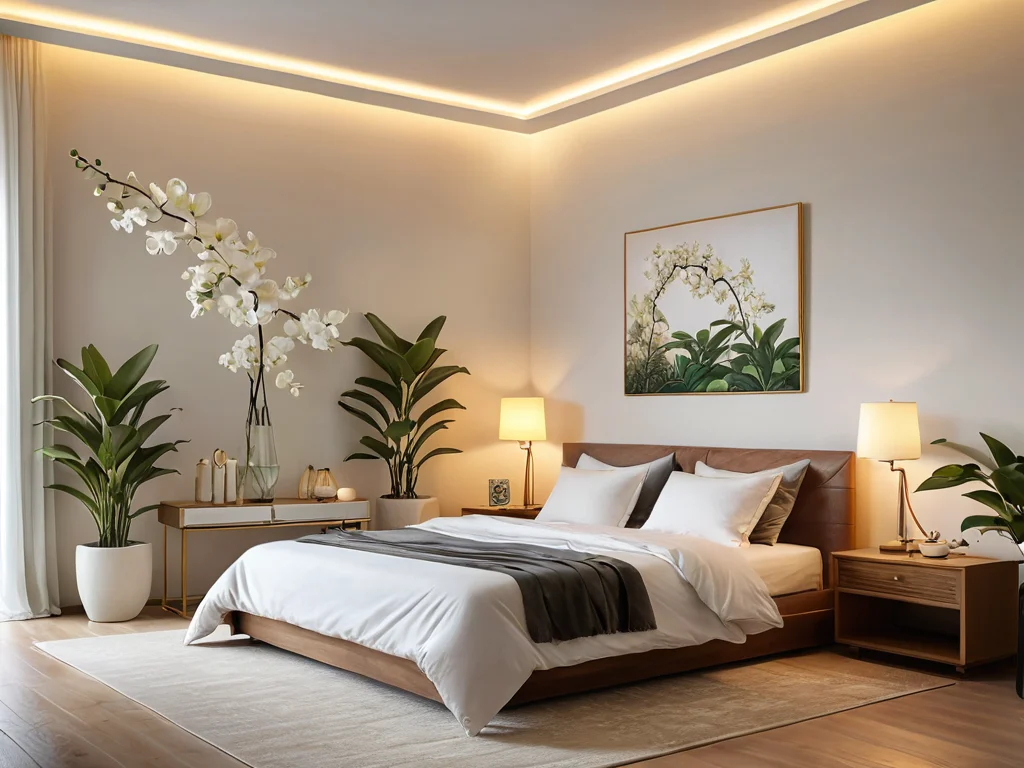
In addition to plants that promote restful sleep and air purification, there are those that, according to Feng Shui teachings, can enhance the energy of love, romance, and overall well-being in the bedroom. These plants bring not only aesthetic beauty but also subtle vibrations that contribute to harmonizing personal relationships and attracting positive events.
- Orchid:
- Feng Shui Symbolism: The orchid is considered one of the strongest symbols of love, beauty, fertility, and abundance. Its delicate yet exquisite flowers can bring the energy of romance and passion into the bedroom. It is believed to help find a soulmate and strengthen existing relationships. Different orchid colors have their nuances: white – purity and innocence, pink – tender love, purple – respect and nobility.
- Bedroom Specifics: Choose varieties with not too strong a fragrance. Place it in the southwest sector of the bedroom (love and marriage sector according to Bagua) to enhance its effect.
- Important Note: While orchids are beautiful, some varieties have a rather intense scent. Make sure the aroma of your chosen plant will not interfere with your sleep.
- Jasmine:
- Feng Shui Symbolism: Jasmine is known for its intoxicating yet calming aroma. It is associated with love, romance, purity, and spiritual awakening. Jasmine is believed to attract positive energy and improve the quality of marital intimacy, strengthening the bond between partners. Its presence in the bedroom can contribute to deeper and more sincere relationships.
- Health Benefits: Helps relieve stress, anxiety, and improves sleep due to its calming aroma.
- Bedroom Specifics: As with lavender, ensure the aroma is not too intense for you personally. Place it where its gentle scent can be pleasantly perceived but not dominant.
- Money Tree (Crassula ovata, Jade Plant):
- Feng Shui Symbolism: The money tree is traditionally considered a magnet for financial well-being and prosperity. Its round, fleshy leaves resemble coins, and the plant itself symbolizes growth and stability. Although it is more often recommended for wealth areas (southeast), a small, healthy money tree in the bedroom can symbolize prosperity in relationships and stability in family life.
- Bedroom Specifics: Choose small specimens that will not clutter the space. Place it not directly next to the bed, but, for example, on a bedside table or shelf. The main thing is that the plant should be healthy and actively growing to symbolize the inflow of energy.
When choosing these plants, it is important to remember the principle of moderation. One or two such plants, correctly placed and cared for, will be much more effective than an excess of them. Their purpose is to complement the overall harmony of the bedroom, not to become the center of attention, distracting from the main purpose of this room – rest and love.
Practical Tips: Where and How to Properly Place Plants in the Bedroom for Maximum Benefit
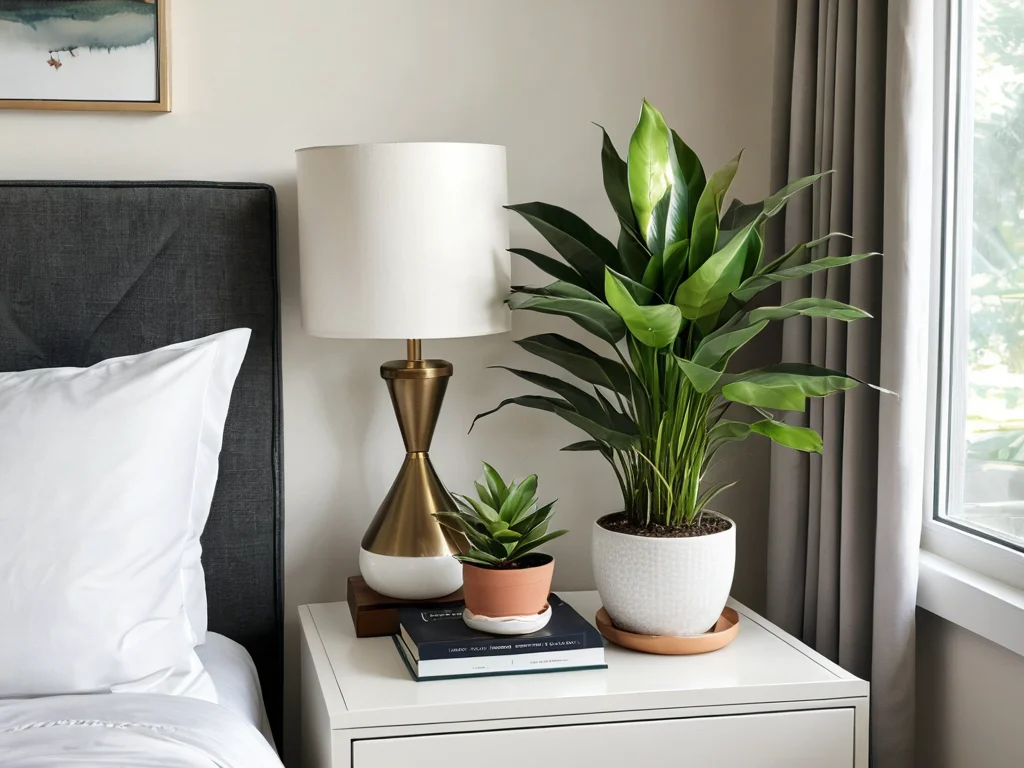
Choosing the right plants is only half the battle. Their placement in the bedroom plays an equally important role as their type. It is believed that proper arrangement allows plants to fully reveal their potential and direct favorable Qi energy to the right corners of your space. Here are some key recommendations from a Feng Shui Master:
- Avoid Direct Proximity to the Bed: Never place plants directly next to the headboard or too close to where you sleep. It is believed that even the most beneficial plants absorb oxygen and release carbon dioxide at night, which can negatively affect sleep quality. Furthermore, their active Yang energy can be too strong for the resting zone. Leave sufficient distance between yourself and the plant.
- Windowsills and Bedside Tables (at a Safe Distance): These are ideal places for small plants, especially if they need light. On the windowsill, a plant can filter external energy, and on a bedside table (provided it’s not directly by your head), it can create a pleasant atmosphere. Ensure pots are stable and do not pose a risk of falling.
- Room Corners: Corners are often places where Qi energy stagnates. A small, healthy plant placed in a corner can help activate this zone, dispersing stagnant energy and attracting fresh energy. Choose plants with rounded shapes for these purposes.
- Avoid Plants Opposite the Door or Mirror: It is believed that a plant opposite the door can block the entry of favorable energy. Opposite a mirror, it can double the already active Yang energy, which is undesirable for the bedroom.
- Quantity and Size: As mentioned, moderation is key. Do not overload the bedroom with too many plants. One to three small or medium-sized plants will be quite enough to create a harmonious atmosphere. Too much greenery can turn a bedroom into a greenhouse, which is too active for a place of rest.
- Pot Selection: The material of the pot also matters. Ceramic and clay pots are considered the most favorable as they are breathable and represent the Earth element, which symbolizes stability and coziness. Avoid overly bright, aggressive pot colors. Soft, muted shades are preferred – beige, green, brown.
- Maintain Cleanliness: Regularly wipe plant leaves to remove dust. A clean plant not only looks better but also performs its functions of air purification and Qi energy circulation better. Dusty leaves block energy flow.
Remember that intuition also plays an important role. Feel how a particular plant is perceived by you in a specific location. Your bedroom is a personal space, and your personal sense of comfort is the main criterion.
Common Mistakes in Choosing and Caring for Bedroom Plants According to Feng Shui
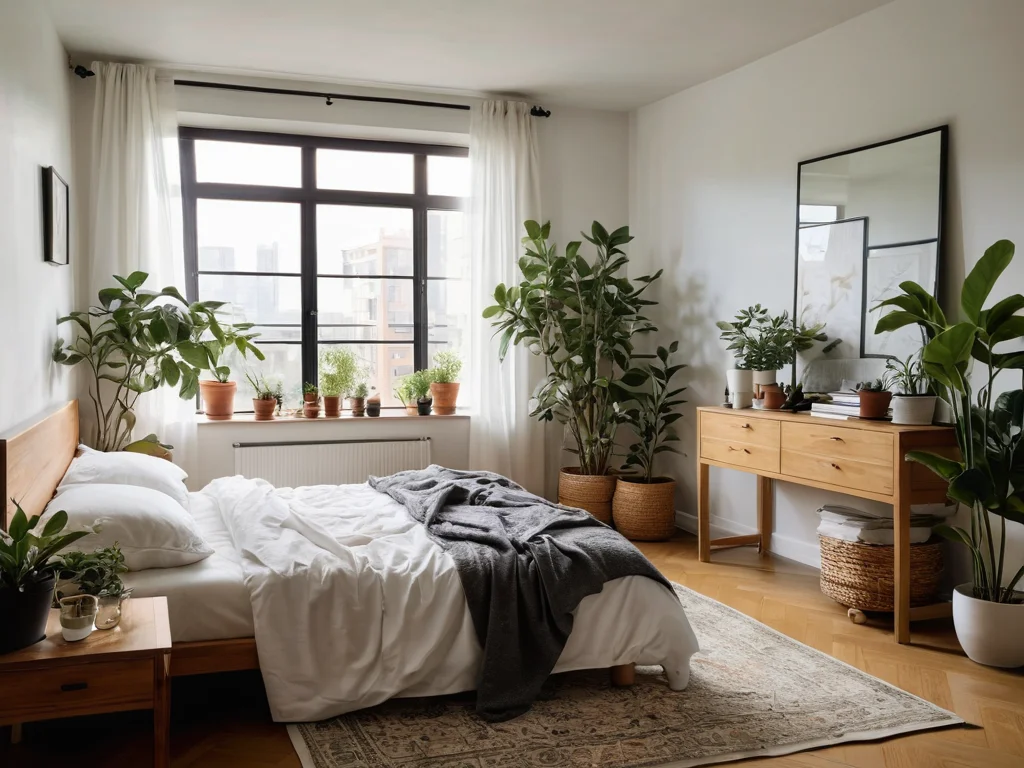
Even with the best intentions, mistakes can be made when integrating plants into the bedroom, which can disrupt the energy balance instead of improving it. A Feng Shui Master always pays attention to these nuances, as they are precisely where the difference between harmony and imbalance lies. Here are the most common mistakes:
- Excess of Plants: This is one of the most frequent mistakes. The desire to surround oneself with greenery can lead to the bedroom turning into a jungle. Too many plants generate excessive Yang energy, making the space too active for sleep. Furthermore, they can compete for oxygen at night, which is unfavorable for breathing. Remember: moderation is key in the bedroom.
- Incorrect Plant Species Selection: Placing cacti, monsteras, dieffenbachias, or strongly scented lilies in the bedroom is a gross violation of Feng Shui principles for a resting zone. As we have already discussed, thorny, aggressive, or overly fragrant plants create Sha Qi and disrupt peace. Always refer back to the list of recommended and prohibited plants.
- Neglecting Care: Sick, wilting, dusty, or dry plants are a source of negative energy. They are believed to attract misfortune, illness, and stagnation in the lives of the home’s inhabitants. If you cannot provide a plant with proper care, it is better not to get one. Dead or dying plants should be immediately removed from the bedroom.
- Plants with Artificial Lighting: Although grow lights can be beneficial for plant growth, their constant glow in the bedroom at night disrupts human circadian rhythms and creates an excess of Yang energy. The bedroom should be as dark as possible for quality sleep. If a plant requires additional light, choose another location or turn off the lights at night.
- Using Artificial or Dried Flowers: From a Feng Shui perspective, artificial flowers (even very beautiful ones) do not carry living Qi energy. They can be a source of “dead” energy. Dried flowers, let alone herbariums, are considered symbols of wilting and stagnation. Their presence in the bedroom can lead to stagnation in relationships and loss of vitality. Live is always preferable to artificial or dead.
- Placing Plants that Block Passages or Views: A plant should not obstruct free movement in the room or block the view from the window. This creates obstacles for Qi energy circulation and can cause a feeling of confinement or frustration.
- Purchasing Plants Without Considering Their Energetic Impact: Sometimes we choose plants solely based on their appearance, without considering the energy they carry. Always remember that every flower, every leaf has its own energy field that interacts with yours.
By avoiding these common mistakes, you can create a truly harmonious and supportive space in your bedroom that will contribute to your health, happiness, and well-being.
Your Bedroom – An Oasis of Peace: Creating the Ideal Space with Plants
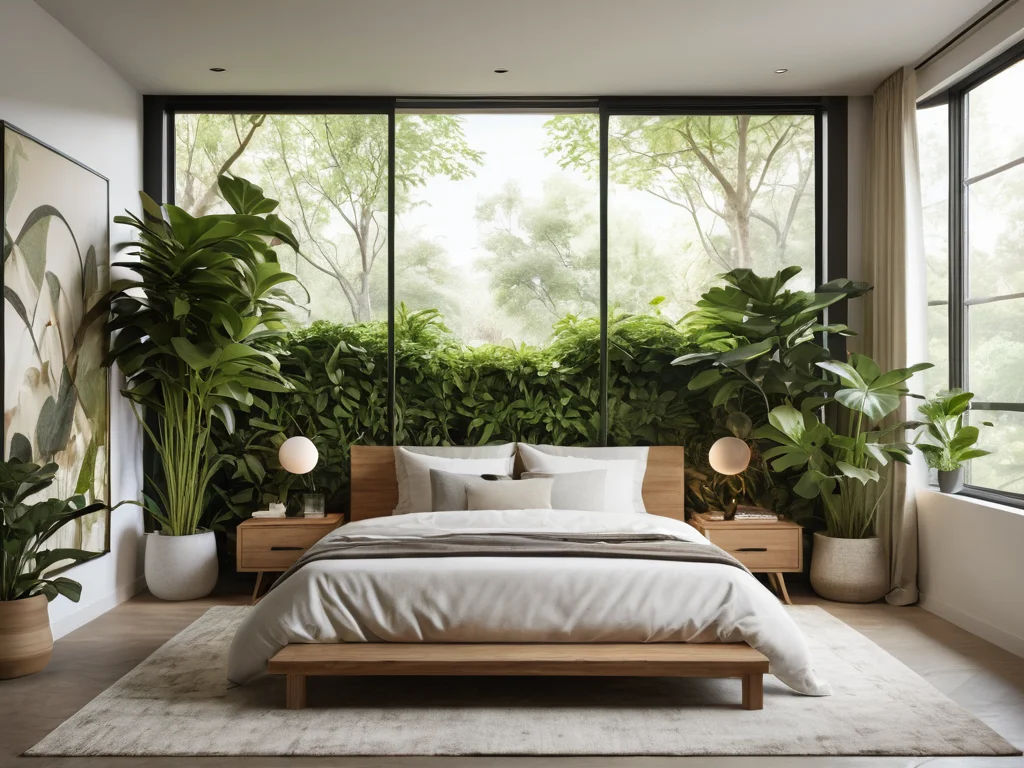
We conclude our journey into the world of Feng Shui plants for the bedroom, and I sincerely hope that this knowledge will be a valuable guide for you. Your bedroom is not just a room; it is a personal refuge, a sanctuary where you restore your strength, draw inspiration, and connect with your inner self. With a thoughtful choice and placement of living plants, you can transform it into a true oasis of peace, love, and prosperity.
Remember that the main goal of Feng Shui is harmony. Plants in the bedroom should bring calmness, freshness, and vitality without overwhelming the space or causing anxiety. They should be your silent allies in creating the ideal atmosphere for rest and restoration. They are not just decor but active participants in your life, capable of improving air quality, reducing stress, and even strengthening personal relationships.
By applying the principles we have discussed – choosing plants with soft, rounded leaves, preferring those that purify the air and calm the nervous system, avoiding aggressive shapes and strong aromas, and ensuring proper care – you are taking a conscious step towards improving your life. Every healthy, well-maintained plant will radiate positive Qi energy, filling your bedroom with light and tranquility.
May every morning in your bedroom begin with a feeling of freshness and lightness, and may every evening bring deep and restorative sleep. Allow living plants to become your guides to a world of harmony and well-being. Create a space that will nourish you, protect your sleep, and promote prosperity in all areas of your life. Your bedroom deserves to be ideal, and you have all the tools to achieve it.
